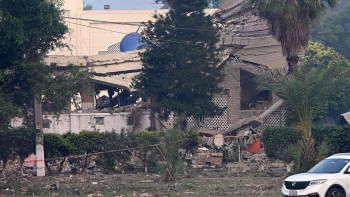Bangladesh yet to benefit from second submarine cable
The ICT sector is being deprived of the benefits of the country's second undersea cable, as its inland link is still not ready for commercial use.
Bangladesh got connected with the South East Asia-Middle East-Western Europe 5 (SEA-ME-WE 5) cable at the landing station in Kuakata on February 21; the government had a target to inaugurate it by mid March.
All the 18 other consortium members, except Bangladesh, have been enjoying the services for the last two months or so.
Until the cable is connected, Bangla-desh is unable to reduce its dependency on bandwidth imports from India either, said industry insiders.
Bangladesh Submarine Cable Company Ltd (BSCCL) was one of the founding members of the undersea cable.
An inland link has been installed but before an alternative cable is installed, BSCCL cannot go for a commercial launch, said officials.
"We can't say exactly when we will be able to start our services through this cable," said Monwar Hossain, managing director of BSCCL.
The work on the alternative link is underway, and it is scheduled to be completed in the last week of this month, said Hossain.
There will be a coordination meeting on April 25; a probable time can be declared then, he added.
Earlier on March 2, during a visit to the landing station, State Minister for Telecom Tarana Halim told journalists that commercial operations of the cable would begin in the first half of March.
However, when asked on Monday, she declined to comment on the matter. Tarana attended a meeting on this issue last week and asked authorities to submit a report on it.
As per the telecom act, BSCCL cannot establish any connectivity link and that is why it is depending on state-owned Bangladesh Telecommunications Com-pany Ltd (BTCL) for it.
For the last two years, BTCL has been working on it but failed to complete the connectivity from Kuakata to Dhaka. BTCL communication team declined to comment.
After being connected with the cable, the country will get an additional 1,400 gigabits per second (Gbps) of bandwidth, which will reduce bandwidth imports from India.
Bangladesh is now using 170 Gbps bandwidth of its first submarine cable, and importing another 240 Gbps from India.
"If we get services from the second cable at competitive prices, we will not use imported bandwidth," said Imdadul Haque, general secretary of Internet Service Providers Association of Bangladesh (ISPAB).
He requested the government to reduce the price disparity between imported and local bandwidth. Currently, one Mbps of local bandwidth costs about Tk 700, which is around Tk 500 for imported bandwidth.
To address the issue, BSCCL has started a process to reduce the price of its bandwidth by around 20 percent, said Hossain, its MD.
The second submarine cable project costs Bangladesh Tk 660.64 crore; BSCCL took a loan of $44 million from the Islamic Development Bank.
Repayment in instalments will begin in October 2017. "Had we been connected earlier, it would have helped us in repayment," Hossain added.
Bangladesh got its first submarine cable connection -- SEA-ME-WE-4 -- in 2006.

 For all latest news, follow The Daily Star's Google News channel.
For all latest news, follow The Daily Star's Google News channel. 



Comments